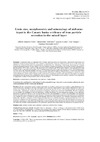Please use this identifier to cite or link to this item:
https://accedacris.ulpgc.es/jspui/handle/10553/18587
| Title: | Grain size, morphometry and mineralogy of airborne input in the Canary basin: evidence of iron particle retention in the mixed layer | Other Titles: | Granulometría, morfometría y mineralogía de polvo atmosférico que entra a la cuenca canaria: evidencia de retenciónde partículas de hierro en la capa de mezcla | Authors: | Jaramillo Vélez, Alfredo Menéndez González, Inmaculada Alonso Bilbao, Ignacio Mangas, José Hernández-León, Santiago |
UNESCO Clasification: | 2501 Ciencias de la atmósfera 2502 Climatología |
Keywords: | Polvo sahariano Análisis textual Partículas de hierro Islas Canarias Saharan dust, et al |
Issue Date: | 2016 | Journal: | Scientia Marina | Abstract: | Aeolian dust plays an important role in climate and ocean processes. Particularly, Saharan dust deposition is of importance in the Canary Current due to its content of iron minerals, which are fertilizers of the ocean. In this work, dust particles are characterized mainly by granulometry, morphometry and mineralogy, using image processing and scanning northern Mauritania and the Western Sahara. The concentration of terrigenous material was measured in three environments: the atmosphere (300 m above sea level), the mixed layer at 10 m depth, and 150 m depth. Samples were collected before and during the dust events, thus allowing the effect of Saharan dust inputs in the water column to be assessed. The dominant grain size was coarse silt El polvo atmosférico juega un papel importante en el clima y en los procesos oceánicos, particularmente la deposición del polvo sahariano es de suma importancia en la corriente canaria debido a que contiene minerales de hierro que actúan como fertilizante del océano. En este trabajo las partículas de polvo fueron caracterizadas mediante granulometría, morfometría y mineralogía, usando procesamiento de imágenes, microscopia electrónica (SEM-EDS). El polvo analizado en este estudio fue generado al norte de Mauritania y Sahara Occidental. Su concentración fue medida en tres ambientes diferentes: la atmósfera (300 m.s.n.m.), la capa de mezcla (10 m de profundidad) y a 150 m de profundidad). |
URI: | https://accedacris.ulpgc.es/handle/10553/18467 | ISSN: | 0214-8358 | DOI: | 10.3989/scimar.04344.27A | Source: | Scientia Marinav [ISSN 0214-8358], v. 80 (3), p. 395-408 | Rights: | by-nc-nd |
| Appears in Collections: | Artículos |
SCOPUSTM
Citations
5
checked on Jun 8, 2025
WEB OF SCIENCETM
Citations
5
checked on Jun 8, 2025
Page view(s)
77
checked on Jan 24, 2024
Download(s)
121
checked on Jan 24, 2024
Google ScholarTM
Check
Altmetric
Share
Export metadata
Items in accedaCRIS are protected by copyright, with all rights reserved, unless otherwise indicated.
